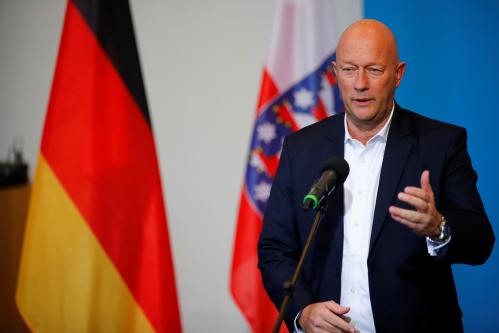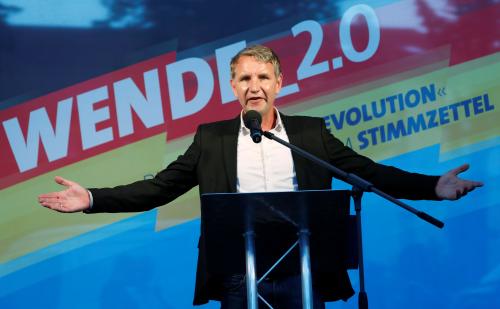On February 10, Annegret Kramp-Karrenbauer, German defense minister and head of the center-right Christian Democratic Union (CDU), announced that she would resign as party chairwoman and not seek to become the CDU’s chancellor candidate in the next general election.
Kramp-Karrenbauer (widely referred to as AKK) will keep her position in Chancellor Angela Merkel’s government as the minister of defense. While her withdrawal as Merkel’s heir apparent came as a surprise, it is also part of a causal chain — one that increasingly looks like a political avalanche — that began in October 2019 with regional elections in the small eastern German state of Thuringia. With Germany likely facing a period of considerable political turmoil as the CDU searches for a new leader, four storylines stand out.
1How a small eastern German state brought down Merkel’s succession plans
The path to AKK’s resignation began with a series of regional elections in the eastern German states of Saxony, Brandenburg, and Thuringia that saw the far-right Alternative for Germany (AfD) receive record levels of support, coming in second place in all three states — to the CDU in Saxony, to the center-left Social Democrats (SPD) in Brandenburg, and to the itself controversial Left Party in Thuringia. Difficult negotiations in Saxony and Brandenburg resulted in uneasy coalitions between the CDU, the SPD, and the Greens.
In Thuringia, finding a majority appeared even more difficult. The three-party coalition of the Left Party, SPD, and Greens that had governed the state under the pragmatic Left Party minister president Bodo Ramelow lost its majority. Losses by the CDU and SPD, coupled with the AfD’s strength in the region, put a majority out of reach of any previously attempted coalition.
Ramelow nonetheless stood for reelection when Thuringia’s parliament opened on February 5. After Ramelow failed to achieve a majority in two votes, Thomas Kemmerich, the regional leader of the liberal Free Democrats (FDP), presented himself as a candidate and won a narrow plurality with the support of both the CDU and the AfD.
Kemmerich’s election was seen as breaking a powerful national political taboo: the first time a minister president of one of Germany’s 16 states has won office with the support of the AfD. All of Germany’s democratic parties have ruled out cooperation with the far-right party. But regional and local party groupings of the CDU — worried by their own vote losses, particularly in Germany’s east — have been protesting this prohibition. In the subsequent nationwide uproar, the local party groups of CDU and FDP held their ground.
Ultimately, their leaders had to retract — but AKK’s resignation came first. Meanwhile, the FDP’s national leader, Christian Lindner, with whom Kemmerich claimed he had been in constant contact before the vote, called and survived a vote of no-confidence in his own party. The fallout from Thuringia continued on Sunday, when regional elections in the city-state of Hamburg saw the CDU slump to third place with 11.2% of the vote.
2Back to square one for the CDU
The leadership struggle in the CDU is now wide open again, only 14 months after a party conference vote (preceded by eight regional conferences) had narrowly settled on AKK. On February 25, two candidates formally presented themselves in Berlin: former BlackRock executive Friedrich Merz, who led the CDU in the federal legislature 20 years ago and unsuccessfully ran against AKK for the party leadership last year; and Armin Laschet, the minister president of North Rhine-Westphalia, Germany’s largest state. Norbert Röttgen, chair of the foreign policy committee in the federal legislature, had been first to declare, a week earlier.
Each would take the CDU in a notably different direction. Merz, a long-standing critic of Chancellor Merkel, is the hope of the party’s more conservative, business friendly-wing. He is immovably convinced that a substantial portion of AfD voters can be brought back to the CDU with hardline policies. Laschet, a bridge-building liberal, embodies continuity for Merkel’s centrist modernizing impulses. In a clever move, he has managed to bring on his team the much more conservative health minister Jens Spahn. Of the three, Röttgen has by far the most credibility on foreign and security policy, but little broad-based political support.
At a time when tensions between western and eastern Germans are running high, Merz is the only one who has worked hard to garner support in eastern Germany. Yet many Christian Democrats worry that he might meet the same fate with an AfD-lite campaign as the Bavarian minister president Markus Söder, who tried this recipe in 2018, and promptly lost the sacred absolute majority of the CDU’s Bavarian sister party.
The contest between the candidates is expected to be decided at a special party conference in April.
3What about Merkel?
Speculation that Merkel might step down before the end of her fourth term in 2021 once more appears to be premature. In fact, the spectacle of what already promises to be a gloves-off contest between the two front contenders Merz and Laschet may well solidify her position. Germans by and large appreciate the stability she brings; polls conducted after AKK’s resignation showed 61% in favor of continuing the grand coalition with the SPD. (Support among the CDU and SPD ranks is higher still, as 87% and 67% respectively favor staying in the coalition.) The SPD, buoyed by a rare win in its traditional stronghold of Hamburg on Sunday, has no interest in letting any of the CDU candidates step in and do a public trial run before regular elections.
Another argument for continuity is that in the second half of 2020, Germany takes on the European Union’s rotating presidency. At a time when Europeans are fighting over the consequences of Brexit, the EU budget, and increasingly tense relations with great powers, Merkel’s experience carries greater weight than ever. There may be an even more urgent reason in the making. Health minister Spahn acknowledged Wednesday that the rapid distribution of coronavirus cases in Germany suggests an epidemic is underway. Should it morph into a real public health crisis, stability-minded Germans are even less likely to want personnel changes at the top levels of government.
However, should Merz win the CDU leadership contest in the spring, the fraught relationship between him and the chancellor could make for an exhausting year for all concerned.
4The AfD proves itself as a mature political force
The Thuringian debacle reveals that the AfD, two and a half years after entering the federal legislature for the first time, has matured to become a very savvy political operator. When the AfD entered the Bundestag following elections in 2017, the party ranks were largely inexperienced; its leadership was divided between hardliners and “moderates” intent on reaching out to mainstream conservatives. Yet it has been very successful at shifting the “Overton window” of acceptable discourse in Germany’s national debate by constant calculated violations of cultural and political norms. It has used the instrument of the “Kleine Anfrage” — the right of parliamentary groups to request information of the executive — in profusion to clog the works of ministries and agencies. At the AfD’s national conference in December, its hard-right wing (the so-called “Flügel”) won and imposed discipline on the party. And right-wing violence in Germany has been surging, most recently in the German city of Hanau, where an extremist targeting Muslims killed 11 people in a shooting spree.
Thuringia represents a further evolution of the AfD’s strategy: weaponizing the German political system against the establishment. Writing after the election of Kemmerich, Götz Kubitschek, a leading ideologue of Germany’s far right, congratulated Björn Höcke, the head of the Thuringian AfD, for his “chess move,” by simultaneously electing one person in Thuringia and “chopping off the legs of another chair in Berlin.”
Yet there is only one path to actual power for the AfD: co-opting the CDU in the east. Preventing this is the most significant challenge the next leader of the CDU will have to confront. Even if he (and all indications at this point are that it will be a he) succeeds, he then faces a no-less daunting challenge: adapting a once proud “people’s party” to a future in a fragmented and volatile German political landscape whose boundaries are no longer defined in terms of “left” and “right,” but by the cosmopolitan, integrationist Greens and the aggressively nativist AfD.
The Brookings Institution is committed to quality, independence, and impact.
We are supported by a diverse array of funders. In line with our values and policies, each Brookings publication represents the sole views of its author(s).










Commentary
The Thuringia debacle resets the Merkel succession — and proves the AfD is a force to be reckoned with
February 28, 2020